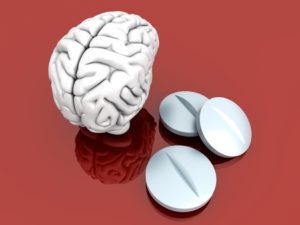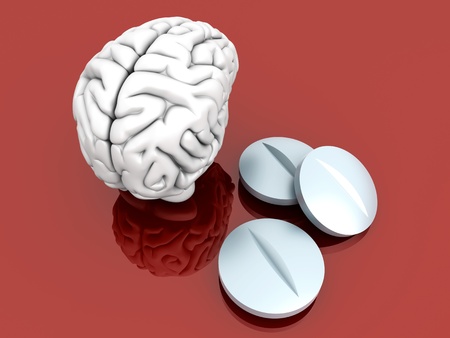
The American Journal of Psychiatry published an article by Goff et al. that addressed concerns that antipsychotic medications can adversely effect long-term outcomes of people with schizophrenia. Their conclusion was that there was little evidence to support “a negative long-term effect of initial or maintenance antipsychotic treatment on outcomes,” when compared to withholding medication treatment. Additionally, the researchers said while a subgroup of patients may benefit from “nonpharmacological treatment approaches,” they warned of the potential for an “incremental risk of relapse” and recommended the need for further research into the question. But did these researchers have a blind spot in how they evaluated their evidence?
In part one of this article, I reviewed some of the research evidence that supported concerns with long-term antipsychotic treatment. There was evidence supporting a link between long-term antipsychotic use and adverse cardiovascular events, brain shrinkage, and dopamine supersensitivity, as well as questions regarding the efficacy of antipsychotic maintenance treatment. There also seemed to be a disregard in Goff et al. of the evidence for the risk of metabolic syndrome with long-term antipsychotic use in their risk-benefit analysis of antipsychotic use. Yet health concerns from metabolic syndrome have been connected to the glaring difference in a shortened life expectancy, with persons suffering with serious mental illness dying 25 years earlier than the general population.
My previous encounters with Dr. Jeffrey Lieberman, who was the lead researcher for Goff et al., have led me to be cautious of his assertions without further investigation. I believe he has a serious blind spot when it comes to assessing and interpreting information counter to his position. See (“A Censored Story of Psychiatry, “Part 1, Part 2; “Psychiatry, Diagnose Thyself!” Part 1, Part 2) for more on my concerns with Dr. Lieberman. So if there was a blind spot in Goff et al., what do other experts have to say about their conclusions?
Joanna Moncrieff wrote a response to Goff et al. on the Mad in America website, which can be accessed here. Moncrieff is a practicing psychiatrist, academic and author. She is one of the founding members and current co-chair person for the Critical Psychiatry Network, “a group of psychiatrists from around the world who are sceptical of the idea that mental disorders are simply brain diseases and of the dominance of the pharmaceutical industry.” She has written extensively on this issue, including a recent book on the troubling story of antipsychotic drugs entitled: The Bitterest Pill. You can read more about her thinking and her background on her website. She said she was shocked by how Goff et al. dismissed the concerns with long-term antipsychotic treatment and the evidence of brain impacts.
It is riddled with distortion, ignores the most pressing criticisms, and is shot through with the unexamined presumption that the multitude of problems currently labelled as schizophrenia or psychosis will one day be revealed to be due to a specific brain abnormality that is targeted by antipsychotics.
She doesn’t dispute the usefulness of antipsychotics for treating acute psychosis, what Goff et al. called initial antipsychotic treatment. Yet she noted where “decades of research into early intervention has not demonstrated that early antipsychotic treatment improves long-term outcomes.” She pointed out where Goff et al. stated the effectiveness of maintenance treatment has been well established, but then failed to acknowledge that randomised trials of maintenance treatment were typically maintenance treatment versus sudden withdrawal. “Thus they completely fail to address concerns that effects of withdrawal of long-term treatment inevitably confound such studies.”
The most worrying thing about the Goff et al. paper to Moncrieff was the minimization of the evidence that antipsychotics produce brain shrinkage. They claim that shrinkage of brain grey matter has been shown to be part of schizophrenia, claiming that brain differences were detected long before the introduction of antipsychotics. The paper they cited was a 1985 study by Bogerts and Schonfeldt-Bausch, which was a post mortem study done long after antipsychotics had been introduced.
The presence of differences between the brains of people with schizophrenia and controls does not establish that there is progression of brain volume loss, which is what has been clearly demonstrated in people and animals taking antipsychotics. There are no studies that show progressive brain changes in people diagnosed with schizophrenia or psychosis in the absence of antipsychotic treatment.
Dr. Moncrieff concluded her article by saying:
I still think antipsychotics can be useful, and that the benefits of treatment can sometimes outweigh the disadvantages, even in the long-term for some people. However, it does no one any service to pretend that they are innocuous substances that somehow magically transform (hypothetically) abnormal schizophrenic brains back to normal. Psychiatrists need to be fully aware of the detrimental effects of antipsychotics on the brain and body. They also need to acknowledge the way these drugs make life so miserable for many people, even for some who might have been even more distressed were they to be without them… Psychiatrists need to support people to evaluate the pros and cons of antipsychotic treatment for themselves and to keep doing this as they progress through different stages of their problems. To do this they need to be able to acknowledge the real nature of these drugs, and not sweep inconvenient truths under the carpet!
Miram Larsen-Barr also wrote a response to Goff et al. that appeared on Mad in America, which can be accessed here. She is a clinical psychologist with the University of Auckland, New Zealand. Larsen-Barr created and is the Service Director for Engage Aotearoa, an initiative that aims to make recovery information more easily accessible to the general public. She has “lived experience” of recovery from trauma, depression and suicidality. Her doctoral research explored experiences of taking, and attempting to stop, antipsychotic medication.
For her doctoral research she talked to 144 people who take or have taken antipsychotics. One-third thought antipsychotics had relieved their symptoms and given them back their lives—but another third said quite the opposite. She said the claim that the benefits of antipsychotic medications conclusively outweigh the adverse effects is just not true. It is true for some; entirely the opposite for others; and a mixed bag for the remaining individuals. You can access a copy of her thesis research here.
In my study, overall subjective experiences ranged on a continuum from “life-saver” to “hell” and every point between (Larsen-Barr, 2016). Around a third reported overall positive experiences such as “A major relief from the monsters […] for me they have saved my life” and “Helped me get through an unstable period of my life.” And around a third of the participants reported mixed experiences such as, “A short term help when needed then a burden” and “A double edged sword. They help me with my bad experiences but they also take away the wind in my sails.”Another third reported wholly negative experiences such as, “The worst experience of my life […] affected every aspect of my health and wellbeing.” The therapeutic benefits certainly did not outweigh the costs for those who described the overall experience of taking antipsychotics as “The ruin of my life” or said they were “Helpful to a point but […] robbed me of everything I value in myself as a person.”
Larsen-Barr reported that few people in her study reported being well-informed of the potential benefits and risks before antipsychotic treatment. While about one-third reported beneficial results, 79% overall did contemplate stopping their medication, with 73% making at least one attempt. She said her study suggested the desire to stop antipsychotic medications was not just because of negative experiences. These decisions were primarily based upon whether or not taking AMs helped the person to “function in daily life.”
A full third of her survey sample had discontinued medications at the time of the study, which was similar to the stable discontinuation rate found in Harrow’s long-term study. Larsen-Barr found half of 105 survey participants who attempted to stop remained AM-free for one year or more; some over five years ago. Her research showed “withdrawal often entails a lack of information, poor support, and a range of physical, emotional, cognitive, social and functional disruptions that can be difficult to cope with, and which may include exacerbation of symptoms to the point of relapse.” For more on the Harrow study and concerns with antipsychotics, see “The Case Against Antipsychotics” by Robert Whitaker and “Worse Results with Psych Meds” on this website.
In part 1 of this article there was a discussion of how Carrie Fisher’s sudden cardiac death may have been associated with her use of psychiatric medications. Yet the possibility of her medications being a contributing factor to her death seemed to be overlooked in many articles about her unexpected death. For example, writing for Scientific American, Tori Rodriguez raised the possibility that Fisher’s bipolar disorder played a role in her death. Not the medication used to treat her bipolar disorder, but the disorder itself.
“Did Carrie Fisher’s Bipolar Disorder Contribute to Her Death?” noted several possible connections to her bipolar disorder, but only made an oblique comment about how the medications may cause adverse effects like weight gain, diabetes higher triglycerides and even sudden cardiac death. Rodriguez noted how Fisher’s earlier substance abuse and struggles with her weight have been speculatively raised as contributing factors to her death. But she said one possibility that has been overlooked was the connection between bipolar disorder and cardiovascular disease and mortality. Individuals with bipolar disorder are twice as likely to develop or die from cardiovascular disease. The onset of cardiovascular disease occurs up to 17 years earlier in persons with bipolar disorder than in the general population. But as we’ve seen, that connection seems to be with the medications and not the disorder itself.
Rodriguez said Carrie Fisher “fit the bill” for several of the risk factors for sudden cardiac death at different points in her life. Then she said: ‘There is no definitive way to know whether her bipolar disorder or addiction history contributed to her death.” Yet there does seem to be a strong likelihood that not only did her use of antipsychotic medications help her be a better mother, friend and daughter, it may have contributed to her sudden cardiac death as well.





